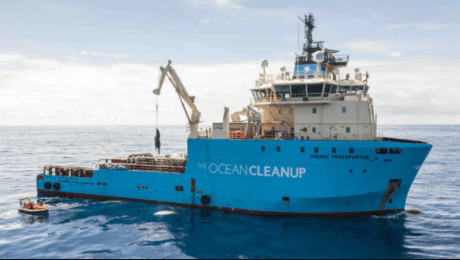The Dutch environmental organization The Ocean Cleanup and A.P. Moller- Maersk have extended their relationship by three more years.
The organization’s mission is to develop advanced technologies to rid the world’s oceans of plastic. To achieve this goal, they aim to stop the inflow via rivers and clean up what has already accumulated in the ocean. Its ultimate goal is reaching a 90% reduction of floating ocean plastic by 2040.
“As a responsible maritime operator, we are committed to ensuring that the oceans can remain a healthy environment for generations to come. We are therefore very pleased to not just prolong but broaden the partnership agreement initiated back in 2018,” Mette Refshauge VP, Corporate Communications & Sustainability, Maersk, said.
Besides Maersk Supply Service support with vessel operations and offshore project management, Maersk will now support The Ocean Cleanup with logistics end-to-end handling services, ranging from worldwide shipment from different locations to airfreight, container & special transport, customs clearance and warehouse and storage management.
“We will have a transport & supply chain manager fully embedded in The Ocean Cleanup’s office in Rotterdam. That program manager will serve as the single channel for them to engage with the full range of Maersk’s supply chain and transport services globally and will help The Ocean Cleanup to develop their own supply chain management capacity over time,” he said.
“Maersk’s support over the last three years has been invaluable to furthering our mission. We are grateful to not only renew this partnership, but to strengthen it with their end-to-end logistics service. This contribution to our mission will not only help us clean more plastic from the ocean, but it will help us to effectively deploy more Interceptors river cleaning systems, and develop our next products made of certified plastic from the Great Pacific Garbage Patch,” said Lonneke Holierhoek, Director of Science & Operations at The Ocean Cleanup.
As part of the partnership agreement, Maersk will also assist The Ocean Cleanup in deploying scientific sensor technology aboard Maersk’s own fleet to map plastic floating in the oceans and help the organization have a better understanding of the severity of the problem they are working to solve.
The goal is to assist The Ocean Cleanup in mapping concentrations of harmful plastic in the world’s oceans to better focus The Ocean Cleanup’s efforts.
With the 1st deployment mission of a system to capture and collect plastic debris in the Great Pacific Garbage Patch officially over, The Ocean Cleanup is now working to develop System 002.
System 002 is planned to be a full-scale cleanup system that is able to both endure and retain the collected plastic for long periods of time.
Currently, The Ocean Cleanup team is working on solutions to tweak the previous version of the system, focusing on its retention abilities so it can stay longer at sea in order to optimize costs.
The duo recently went to the North Sea to test the system before it moves forward with the deployment.
